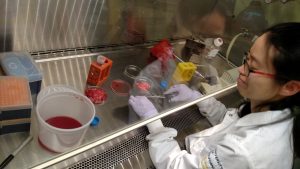
Investigating the physiological role of FATP6:
Fatty acid transport proteins are an evolutionarily conserved family of six proteins that facilitate the movement of fatty acids across cellular membranes. Many of these proteins are expressed in metabolic tissues and have a role in disease pathology and progression. We created a conditional-potential knockout mouse for fatty acid transport protein 6 (FATP6), a member of the family that has not been thoroughly studied. We are specifically interested in the biochemical activity of FATP6 in vivo and its function in cardiac tissue and reproductive organs, including the placenta.
Targeting cardiac fatty acid uptake:
Nearly half of diabetic patients experience cardiac dysfunction. Impaired left ventricular function in the absence of overt cardiovascular disease or hypertension results in a condition called diabetic cardiomyopathy. In response to elevated serum fatty acids and reduced glucose availability, hearts increase fatty acid utilization, leading to cardiac inefficiency and lipotoxicity. We hypothesize that targeting cardiac fatty acid transporters such as FATP6 will reduce cellular fatty acid uptake and therefore protect hearts from diabetic cardiomyopathy. We are currently working to create a mouse model of diabetic cardiomyopathy in which we can analyze the effects of genetic deletion of cardiac fatty acid transporters.
Targeting hepatic fatty acid uptake in a cancer model:
Monitoring fatty acid fluxes in liver through novel in vivo assays using fluorescence labeled fatty acid and bioluminescence imaging method. Using theses methods, we identified deoxycholic acid (DCA), a natural secondary bile acid, as the most potent inhibitor of the liver-specific fatty acid transport protein 5 (FATP5). DCA were able to inhibit LCFA uptake by primary hepatocytes in a FATP5-dependent manner. We are now doing research in the inhibition mechanism of DCA on LCFA uptake through FATP5 and the effects on the survival of the liver cancer intrahepatic cholangiocarcinoma.
